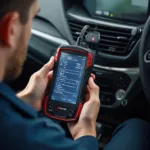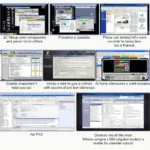The 2003 Cadillac Escalade, like most modern vehicles, utilizes an OBD2 system to monitor engine performance and emissions. When a problem arises, the OBD2 system generates specific codes that can be read using an OBD2 scanner. Understanding these codes is essential for diagnosing and repairing issues with your Escalade.
This comprehensive guide will delve into the common OBD2 codes encountered on a 2003 Cadillac Escalade, explain their meaning, and provide insights into potential causes and troubleshooting steps.
Common OBD2 Codes on a 2003 Cadillac Escalade
While numerous OBD2 codes can be triggered in a 2003 Escalade, some appear more frequently than others. These include:
-
P0171 and P0174: These codes indicate a lean condition in the engine, meaning there is too much air or not enough fuel in the air-fuel mixture.
- Possible Causes: Vacuum leaks, faulty oxygen sensors, malfunctioning fuel injectors, or a restricted fuel filter are common culprits.
-
P0300, P0301-P0308: These codes signify engine misfires. P0300 indicates random misfires, while codes P0301 to P0308 pinpoint the specific cylinder experiencing the misfire.
- Possible Causes: Worn spark plugs, faulty ignition coils, vacuum leaks, or issues with fuel injectors are among the potential triggers.
-
P0420 and P0430: These codes point to a problem with the catalytic converter system’s efficiency. P0420 refers to Bank 1, while P0430 indicates an issue with Bank 2.
- Possible Causes: A failing catalytic converter is a likely cause, but issues like faulty oxygen sensors, exhaust leaks, or even engine misfires can also trigger these codes.
What Do OBD2 Codes Mean for My 2003 Escalade?
OBD2 codes act as your vehicle’s way of communicating that something needs attention. While they don’t pinpoint the exact problem, they offer valuable clues that, when combined with other diagnostic procedures, guide mechanics toward a solution.
Ignoring these codes can lead to more severe engine problems, decreased fuel efficiency, and potential damage to expensive components like the catalytic converter.
How to Diagnose and Address OBD2 Codes on Your Escalade
-
Read the Codes: Begin by connecting an OBD2 scanner to your Escalade’s diagnostic port, typically located beneath the driver’s side dashboard. The scanner will retrieve the stored codes.
-
Research the Codes: Using resources like this guide or an online OBD2 code database, decipher the meaning of the codes displayed on your scanner.
-
Inspect and Test: Based on the code definitions, visually inspect the relevant components like spark plugs, wires, air filter, and look for any visible signs of damage or wear. If necessary, test components using a multimeter or other appropriate diagnostic tools.
-
Repair or Replace: Once you’ve identified the faulty component, repair or replace it as needed.
-
Clear the Codes: After the repair, use the OBD2 scanner to clear the codes from the system’s memory.
Tips for Preventing OBD2 Codes
While some issues are unavoidable, adhering to a regular maintenance schedule can significantly reduce the likelihood of encountering OBD2 codes on your 2003 Escalade.
-
Regular Oil Changes: Adhering to the manufacturer’s recommended oil change intervals is crucial for engine health and can prevent a range of problems.
-
Air Filter Replacement: A clean air filter ensures optimal airflow to the engine, contributing to efficient combustion and potentially preventing lean conditions (P0171, P0174).
-
Spark Plug and Ignition Coil Maintenance: Inspect and replace spark plugs and ignition coils as recommended by the manufacturer to prevent misfires and ensure smooth engine operation.
-
Fuel System Cleaning: Periodically cleaning the fuel injectors and replacing the fuel filter can help maintain optimal fuel delivery and prevent issues related to fuel mixture.
Conclusion
Understanding OBD2 codes on your 2003 Cadillac Escalade is vital for addressing potential issues promptly and keeping your SUV running smoothly. While this guide provides valuable information, remember that a proper diagnosis often involves more in-depth inspection and testing by a qualified mechanic, especially for complex problems. Regular maintenance and addressing codes as they arise can help extend the life of your Escalade and ensure a safe and enjoyable driving experience.

